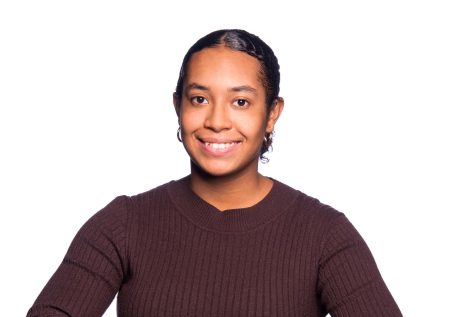Gender Dynamics Professor Hopes For Change In Discussion Acceptance

When Prof. Jacqueline Callahan – Stewart graduated from Mercy College, she remembered when it was a small private college under the Sisters of Mercy.
She remembers not being able to express her thoughts on certain topics or speak up when she felt confused. Now she’s teaching the same classes she had questions in.
Callahan – Stewart, who has been teaching psychology for about 20 years at Mercy College, has taught a plethora of classes throughout the years such as Intro to Psychology and Career and Life Planning. Yet the class that she teaches during spring semesters, Gender Role Dynamics, sticks out to her.
“Gender and gender issues didn’t just emerge out of the blue,” Callahan – Stewart says. “We’ve been on this trajectory for a while as slow as it may seem to be.”
Callahan – Stewart teaches her class with the notion that it will be free from judgment and full of curiosity. She assures students that even if they are entering the class with little knowledge on gender roles, she and the student’s peers will be there to help them.
Gender Role Dynamics is a class that is not mandatory for students and can be taken as an elective. But after teaching it for a couple of semesters now, Callahan – Stewart finds that the open discussion of gender roles and experiences from students is what keeps the class being offered each semester. However, not every college takes the same action as Callahan – Stewart.
According to U.S News and World Report, 426 colleges in the United States offer a gender studies major out of 5,300 colleges and universities in the United States.
Though there is a significant gap in the offerings of the major, Callahan – Stewart believes that times are changing, and unlike her time at Mercy College, more students are willing to talk about gender roles.
“I feel like we are in a generational situation where my generation has stronger beliefs on certain things than a younger generation has” Callahan- Stewart says. “We are in a generational shift, looking at old strongly held beliefs, with the younger students coming up being more open to change and wanting more acceptance”
A Fall 2013 report by The Intelligence Group found that “gender is less of a definer of identity today than it was for prior generations. Rather than adhering to traditional gender roles, young people are interpreting what gender means to them personally.”
However, as Callahan – Stewart points out, the discussion for gender dynamics is ingrained during school, and she has had experiences where students felt nervous to take her class purely because they didn’t know about the topic.
“One of the students in my class told me that the problem she has with school is that teachers expect for you to know everything when you take a class and I said ‘no, that’s why you take the class… if you knew it don’t take the class,'” she said.
Professor Callahan – Stewart believes that education, especially college is a time for students to explore themselves and remembers when she grew up in a family where there are comments that she couldn’t have said.
Though she believes that education is the gateway to a better understanding on issues, she does note that there are limits to things we discuss around a certain age.
“Education has to be age-appropriate, and sometimes we go too far for an age group that might not understand that might not understand.”
She believes that we need to take into consideration what parents say about what their children learn and what they feel is appropriate.
“We should answer questions age appropriately,” says Callahan – Stewart. “Sometimes we give this big explanation, and they weren’t answering that at all.”
Callahan – Stewart is hopeful for the future, and although she is aware of the setbacks that many have been facing, she knows that change is coming.
“This is your generation’s problem to solve, and our generation is not doing everything they could to help solve it.”

Britney Guzman is a Senior at Mercy College. She writes a column called Quali-Tea News where she discusses her love for cats, Taylor Swift and mental...







